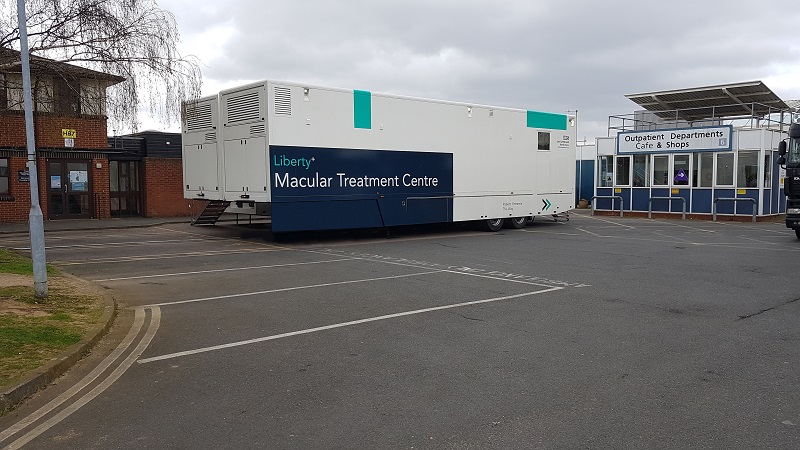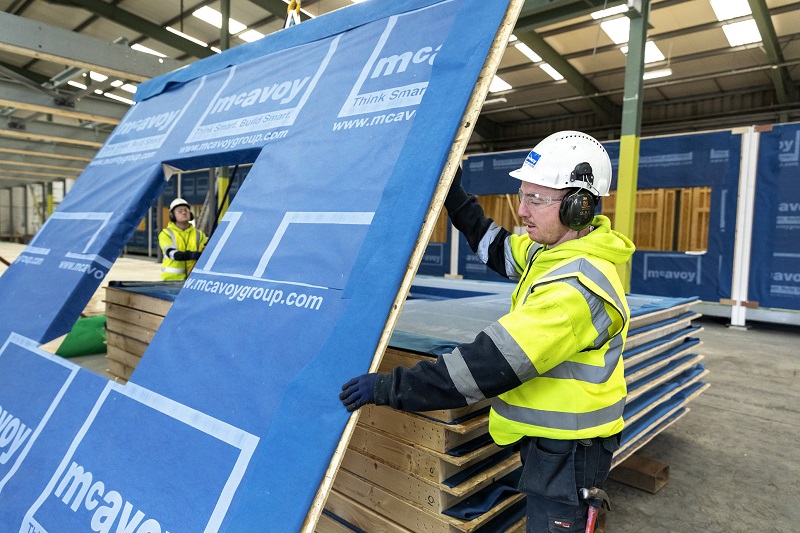Offsite construction methods, such as mobile and modular buildings, are being increasingly deployed to help hospitals cope with the pressure on the healthcare systems brought about by the coronavirus outbreak.
Modular ‘pods’ are popping up across the country as medics struggle to keep patients isolated and prevent further spread of the disease.
They are being used to help triage patients and to house those suspected, or proven, to have the virus.
Speaking to BBH, Jo Quarterman, commercial manager at EMS Healthcare, a supplier of mobile healthcare vehicles and medical trailers, said: “Having spoken with NHS trusts up and down the country, it’s safe to say they are all experiencing different, and multiple, pressures.
Beyond the general sense of uncertainty, hospitals are having to deal with bed space capacity challenges, a lack of available equipment, and staff shortages
“Beyond the general sense of uncertainty, hospitals are having to deal with bed space capacity challenges, a lack of available equipment, and staff shortages.”
The industry body, Buildoffsite, is pro-actively co-ordinating an industry-wide response to the COVID-19 crisis, working to establish a clearer picture of national and regional demand for additional ward space, isolation units and other types of modular buildings, with the aim of supporting the NHS and the Government moving forward.
In particular, trusts are looking to take their most-vulnerable patients out of the hospital environment and into dedicated units located away from potentially-high-risk COVID-19 sufferers.
Quarterman said: “We are seeing a big surge in enquiries for macular units, where patients are typically 70-plus years old, therefore placing them in the ‘vulnerable’ category. These patients need sight-saving injections for wet age-related macular degeneration and therefore hospitals cannot delay their treatment.
“They want to create environments where they can move these people away from those who may have coronavirus.
“We have also been approached for renal dialysis units, infusion units, GP surgeries, and units to be used during clinical trials in search of a new vaccination for the virus.”
Offsite construction specialist, The McAvoy Group, has also seen a surge in enquiries, particularly for its modular intensive care units; staff welfare facilities, such as shower and changing areas; additional ward facilities; mortuary spaces; and drive-thru testing centres for NHS staff and care workers.
Director, Geoff Fawkes, said: “As an industry, the offsite construction sector has enormous experience delivering high-quality clinical buildings very quickly, for both permanent and interim use.
Those offsite specialists which maintain a fleet of interim buildings for hire have the ability to meet immediate needs within hours, as well as larger urgent requirements within just a few weeks
“Those offsite specialists, such as The McAvoy Group, which maintain a fleet of interim buildings for hire have the ability to meet immediate needs within hours, as well as larger urgent requirements within just a few weeks, working to the principles of standardised designs wherever possible.”
Mobile units are a particularly-quick and efficient solution for when NHS trusts require extra capacity fast.
“They can help to protect vulnerable people who need treatment for non-COVID-19 conditions during the pandemic by keeping them outside of the hospital and minimising their contact with other, potentially-infectious, patients,” said Quarterman.
“This, in turn, also frees up additional space within the hospital, which can then be used as COVID-19 treatment areas.
“Units can also be used for clinical trials, supporting vital research.”
Elite Systems is helping the Royal Surrey County Hospital by creating a 20-bed isolation ward for COVID-19 patients.
To be delivered in just eight weeks, groundworks have already begun on site, with the ward housing 20 individual patient rooms, each with an en-suite bathroom.
A central space will be occupied by a nursing station as well as storage space for cleaning supplies and linen, a series of treatment rooms, relatives rooms, and additional toileting facilities.

EMS Healthcare says its mobile solutions are in demand for non-coronavirus patients as they can be located away from potentially high-risk areas
Commenting on the project, Elite Systems’ commercial director, Jason Bowker, said: “In the response to the COVID-19 outbreak, speed is of the essence and when we received the enquiry from the Royal Surrey County Hospital on 13 March we understood that a very-fast turnaround was required – not only in the construction of the hospital, but in the time taken to provide a quote and a detailed outline of the proposed ward.
“Hospitals across the UK are urgently in need of additional space, and with our team’s ability to quickly and safely construct high-quality modular buildings, and our technical division on hand to map out the requirements within days, we are able to help the UK face its biggest crisis in a generation.
People are effectively saying ‘we don’t really know what we want, but we need a building and need the building immediately
“We will continue to make our expertise available to hospitals throughout the summer and would encourage any NHS trusts looking to quickly expand their facilities to contact us and we will respond without delay.”
He added: “Typically, directors of estates are walking out of internal senior meetings and making calls asking for ward space and assessment areas – in the majority of cases it is ‘what can we do within eight weeks’?.
“It is also quite often a plea for help. People are effectively saying ‘we don’t really know what we want, but we need a building and need the building immediately’. They are seeking a ‘can-do’ attitude and the ability to provide a ‘turnkey’ solution which allows them to get on with other important matters.”
Advising trusts faced with ongoing capacity issues, Quarterman told BBH: “Get in contact with a trusted mobile unit provider to discuss your challenges.
“For example, we can adapt our units for a number of different treatment areas in order to provide additional capacity and support through this crisis.
“You also need to consider the space required.
“If you have limited space on the hospital estate, then consider situating a unit at alternative locations such as retail parks, GP clinics, or leisure centre car parks, all of which will currently be sat empty.
“Also, if utilities to support a unit, such as water, waste and power aren’t available at the hospital, let your provider know and they can assist and advise with alternative ways to serve the unit.”
Fawkes adds: “Health service providers need to work with offsite specialists to keep designs and layouts as simple as possible to meet critical needs rapidly.
“Early engagement is also very important to allow manufacturers to plan capacity.”
And he called on the Government to help ensure the supply chain remains in place for the delivery of essential materials and that, as contractors, the logistics and building installation phases can be completed safely and in line with the latest guidance to protect construction staff, their families and local communities.

Modular buildings can be on site in as little as four weeks, while some mobile buildings can be deployed within days
“In terms of space for locating buildings, car parks are ideal,” he adds.
“We have supplied testing centres sited in sports centre car parks.”
EMS Healthcare’s mobile units can be deployed in as little as a week subject to site specification and requirements.
And the company is recommending the units are hired for an initial three-month period, which can then be reassessed as the country moves through the pandemic.
Hospitals are seeking a ‘can-do’ attitude and the ability to provide a ‘turnkey’ solution which allows them to get on with other important matters
New bespoke modular buildings, such as those from The McAvoy Group and Elite Systems, can be on site in as little as four weeks based on a standard design, and can remain on site as long as needed.
Bowker said: “Our approach is to work collaboratively with the hospital and identify the space available on site, develop the building footprint and from that develop what can be achieved in terms of HTM/HBN-designed accommodation.
“We also develop a high-level small design team from both sides – typically representing estates, clinicians/nursing, and infection control – which allows us to quickly work through a scope and finalise a design so we can move to manufacture and groundworks speedily and effectively.”

